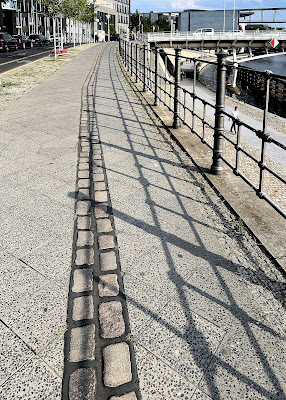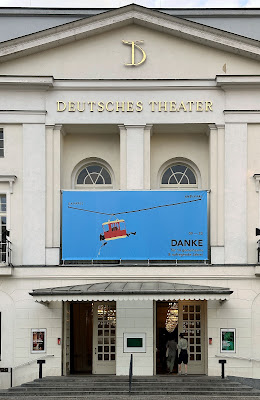On the one hand, 88 symbolizes fortune and good luck in Chinese culture, as the word "eight" sounds similar to the word "fā" (發), which implies "發財" or wealth.

|
| ©Neo-Nazi Numbers |
Neo-Nazis use it as an identifying mark, just as the first Christians outed themselves by sketching a fish. Legend has it that if an early Christian met a stranger, he or she would draw half of an ΙΧΘΥΣ* on the ground. If the stranger completed the sketch, they would both know they were Christians.
*The acronym Ichthys stands for "Ἰησοῦς Χριστός, Θεοῦ Υἱός, Σωτήρ"
and translates as 'Jesus Christ, Son of God, Saviour.'
I spent my birthday and a few days in Berlin with some relatives. The evening before, I went to the Deutsches Theater.
I spent my birthday and a few days in Berlin with some relatives. The evening before, I went to the Deutsches Theater.
I passed our National Debt Clock, which, running backwards before the pandemic, has now reversed and is speeding up due to the war in Ukraine at 3817 euros per second.
This time, I saw the theater building in full daylight and noticed on the left the bust of Heinz Hilpert, another giant of the German theater.
How much time … left? That is a good question. Anyway, young people with their drinks had a good time in a little park in front of the theater.
This time, the performance took place at the Kammerspiele, which translates to "intimate theater," although it simply refers to a smaller auditorium. The Kammerspiele is in the adjacent building to the left of the Deutsches Theater.
The theater performance was Albert Camus' La Peste (The Plague), an adaptation of his novel for the stage. For nearly two hours, one actor played all the characters, sometimes rapidly changing seats on chairs facing each other and switching voices too.
It was an outstanding performance in acting, memory, and physicality.
Unfortunately, the acoustics were terrible, and although Red Baron had
activated his hearing aid, much of the text was swallowed.
Doctor Rieux decides: His place is at the side of those suffering.
*








Nachträglich alles Liebe und Gute auch Dir nachträglich zum Geburtstag! Hoffentlich kann ich noch viele, viele Jahre Deine interessanten Blogs lesen. Herzliche Grüße, Margit
ReplyDeleteThanks for the text of Camus at the end of your blog. That is the reason why Theodizee is such a unsolvable task.
ReplyDeleteThomas Becker, a WiKi friend
ReplyDeleteUlla, Sandkastenfreundin,
ReplyDeleteGlückwunsch!
Dein unermüdliches Interesse, alte Lokalitäten aufzusuchen, führte zur Erneuerung unseres Kontakts und bescherte mir zudem das Vergnügen, mich an deinen Blogs zu erfreuen!